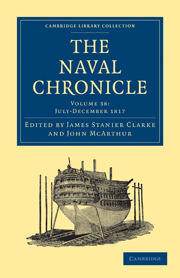 The Naval Chronicle
The Naval Chronicle Book contents
- Frontmatter
- PLATES IN VOLUME XXXVIII: From Original Designs
- PREFACE TO THE THIRTY-EIGHTH VOLUME
- BIOGRAPHICAL MEMOIR OF CAPTAIN WILLIAM LAYMAN, OF THE ROYAL NAVY
- BIOGRAPHICAL MEMOIR OF CAPTAIN WILLIAM LAYMAN, OF THE ROYAL NAVY
- BIOGRAPHICAL MEMOIR OF ROBERT HENDERSON, ESQ. CAPTAIN IN THE ROYAL NAVY
- BIOGRAPHICAL MEMOIR OF THE LATE CHARLES BOYLES, ESQ. VICE-ADMIRAL OF THE BLUE
- BIOGRAPHICAL MEMOIR OF THE LATE WILLIAM FOTHERGILL, ESQ. CAPTAIN IN THE ROYAL NAVY
- BIOGRAPHICAL MEMOIR OF KENNETH MACKENZIE, ESQ. CAPTAIN IN THE ROYAL NAVY
- INDEX
BIOGRAPHICAL MEMOIR OF CAPTAIN WILLIAM LAYMAN, OF THE ROYAL NAVY
Published online by Cambridge University Press: 10 January 2011
- Frontmatter
- PLATES IN VOLUME XXXVIII: From Original Designs
- PREFACE TO THE THIRTY-EIGHTH VOLUME
- BIOGRAPHICAL MEMOIR OF CAPTAIN WILLIAM LAYMAN, OF THE ROYAL NAVY
- BIOGRAPHICAL MEMOIR OF CAPTAIN WILLIAM LAYMAN, OF THE ROYAL NAVY
- BIOGRAPHICAL MEMOIR OF ROBERT HENDERSON, ESQ. CAPTAIN IN THE ROYAL NAVY
- BIOGRAPHICAL MEMOIR OF THE LATE CHARLES BOYLES, ESQ. VICE-ADMIRAL OF THE BLUE
- BIOGRAPHICAL MEMOIR OF THE LATE WILLIAM FOTHERGILL, ESQ. CAPTAIN IN THE ROYAL NAVY
- BIOGRAPHICAL MEMOIR OF KENNETH MACKENZIE, ESQ. CAPTAIN IN THE ROYAL NAVY
- INDEX
Summary
His genius, ever for the event prepared,
Rose with the storm, and all its dangers shared;
And though full oft, to future perils blind,
With skill superior glow'd his daring mind,
Through snares of death, the reeling bark to guide,
When midnight shades involve the raging tide.
Falconer.(Continued from Vol. xxxvii. page 458.)
WE shall now resume the naval biography of Captain Layman. On the recommencement of hostilities, Lord Nelson nominated Mr. Layman to be lieutenant of the Victory, in which ship he sailed with his Lordship for the Mediterranean in May, 1804. In the way out, the Victory retook the Ambuscade frigate, of which Mr. Layman was sent in charge; and on the passage to Gibraltar, captured a French ship and Dutch vessel. Soon after, rejoining Lord Nelson off Toulon, he was appointed, in October, by his Lordship, to the command of the Weazle; in which vessel Captain Layman was immediately despatched to watch the enemy's cruisers, and protect the trade of the Straits, as well as keep open the conveyance of provisions from the coast of Barbary for the supply of the garrison of Gibraltar. In February, 1805, Lord Nelson wrote to Captain Layman, signifying his high approbation of the manner in which the service of the Gut had been executed, and hoping soon to be able to give him a better ship; but this commendation Captain Layman did not receive till after the Weazle had been unfortunately wrecked.
- Type
- Chapter
- Information
- The Naval ChronicleContaining a General and Biographical History of the Royal Navy of the United Kingdom with a Variety of Original Papers on Nautical Subjects, pp. 1 - 88Publisher: Cambridge University PressPrint publication year: 2010First published in: 1817
